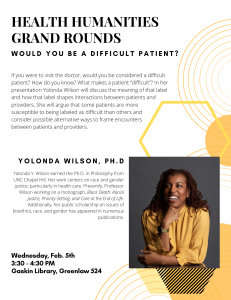 What defines a difficult patient? Could you be defined as a difficult patient? Dr. Yolanda Wilson, an assistant professor of Philosophy at Howard University and current National Humanities Center fellow, utilized these questions to facilitate discussion on the meaning of being labeled a “difficult” patient and its consequences. Ultimately, she demonstrated how this label shapes unjust racial and gender disparities, particularly within the healthcare setting.
What defines a difficult patient? Could you be defined as a difficult patient? Dr. Yolanda Wilson, an assistant professor of Philosophy at Howard University and current National Humanities Center fellow, utilized these questions to facilitate discussion on the meaning of being labeled a “difficult” patient and its consequences. Ultimately, she demonstrated how this label shapes unjust racial and gender disparities, particularly within the healthcare setting.
Last Wednesday, Dr. Wilson opened her discussion by asking listeners to think about what makes a patient “difficult.” The response from the crowd offered characteristics such as: “frequent questioning of medical decisions,” “too many chief complaints,” and other responses of similar origin. Dr. Wilson’s PowerPoint slide, however, showed far more shocking results. A list that she had compiled from multiple physician responses marked that “difficult” patients could range anywhere from having “multiple physical symptoms” to just being “annoying.” Going further down the list, Dr. Wilson directed our attention to one specific descriptor: “repeated medical visits without any medical benefits.” To many, this description suggested that the patient suffered from an ambiguous chronic illness. To Dr. Wilson, however, who knew that statistically women present to the ER with ambiguous symptoms more frequently than men, this descriptor offered a seamless introduction into the world of discriminatory patient-labeling and gender health disparities.
Dr. Wilson explained that what counts as a “difficult” patient often presents as an “ambiguous illness that disproportionately impacts women.” Additionally, she pointed out that the primary point of discrimination is often from the provider. Once labeled as “difficult,” the patient becomes easier to dismiss by others working in the healthcare setting. What is worse, is that a patient usually understands when a label has been placed upon them through tone of voice, eye contact, body language and overhearing conversations between health providers.
As Dr. Wilson further explained, the consequences of hearing such conversations negatively impact both the patient and the provider. From the perspective of the patient, this label often leads to mistrust of the healthcare system and dismissal of their narrative or experience. This loss of value can also lead the patient to express dissatisfaction in their unmet medical needs and encourages the patient to problem-solve, which often creates a self-perpetuating system that eventually circles back to them being labeled as “difficult” via other providers. Additionally, for the provider, the consequences of this label can induce feelings of compassion burnout or result in dismissal of the patient, continuing the self-perpetuating cycle.
Through this example, Dr. Wilson demonstrated the power of epistemic violence that is often enacted upon “difficult” patients by the refusal to regard a patient as someone who knows things. In short, epistemic violence in an act of dismissing the patient, their experience, and their knowledge. This often ends with testimonial suffering, in which the patient truncates his or her own response to medical questioning. As a result, power differentials tend to occur between patients and their providers, inherently shaping interactions between the two and determining how treatment will be carried out in the future.
The last topic of Dr. Wilson’s presentation focused on racial bias and health disparities that occur within the healthcare setting. According to Dr. Wilson, racial bias can be carried out in varying degrees, such as the duration, frequency and blinking rate of eye-contact; judgements that expose mistrust, anger or hostility; and proximity of bodies between the patient and provider (too close or too far). In short, racial bias can be implicit, subtle and elusive, yet it never operates singularly. It has an intersectional component to it that can affect the way diagnostic treatments are recommended, patients are questioned, what kinds of questions are asked, and how many tests are ordered for the patient.
To close, Dr. Wilson posed a question: How does knowing this information impact the future care of patients and what are the future implications for this kind of research?
For Dr. Wilson, the answer lies in educating others to understand the role that bias takes in labeling a patient as “difficult” and to understand the impact of that label on subsequent forms of treatment. She further argued that providers have an obligation to take seriously the power dynamics and biases at play and must enact every effort to make the environment a safe and judgement-free place where the patient can feel heard, understood, and respected.
Savannah is an M.A. student at UNC with a concentration in Literature, Medicine, and Culture. She has a work history in emergency medical Services and medical transportation services, which primarily drives her research interests in the health humanities, focusing on bibliotherapeutic techniques in chaotic work environments, trauma theory, and rhetorical analysis of the metaphorical language in EMS provider personal narratives.


